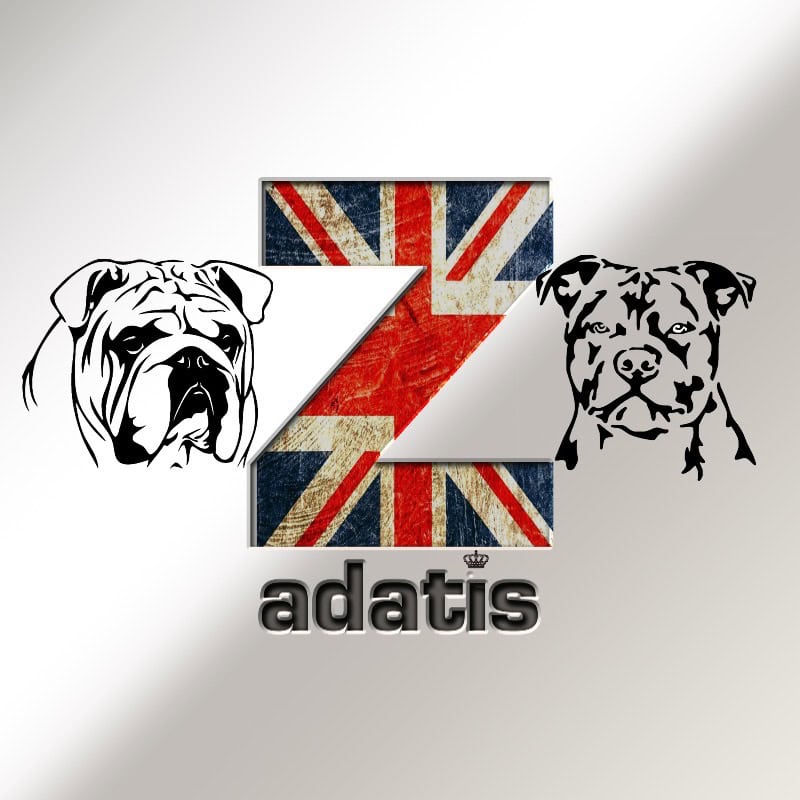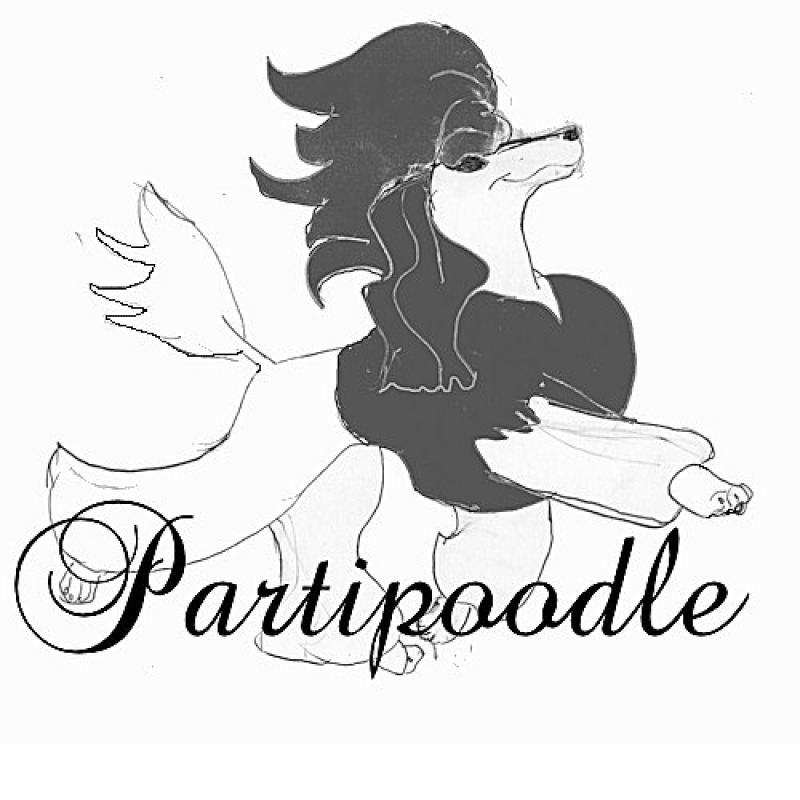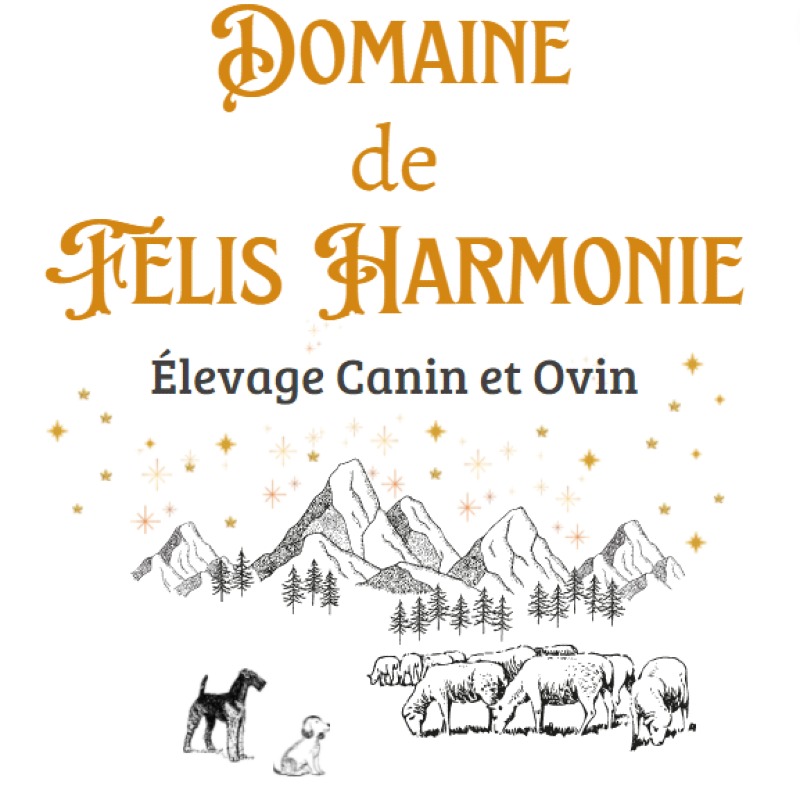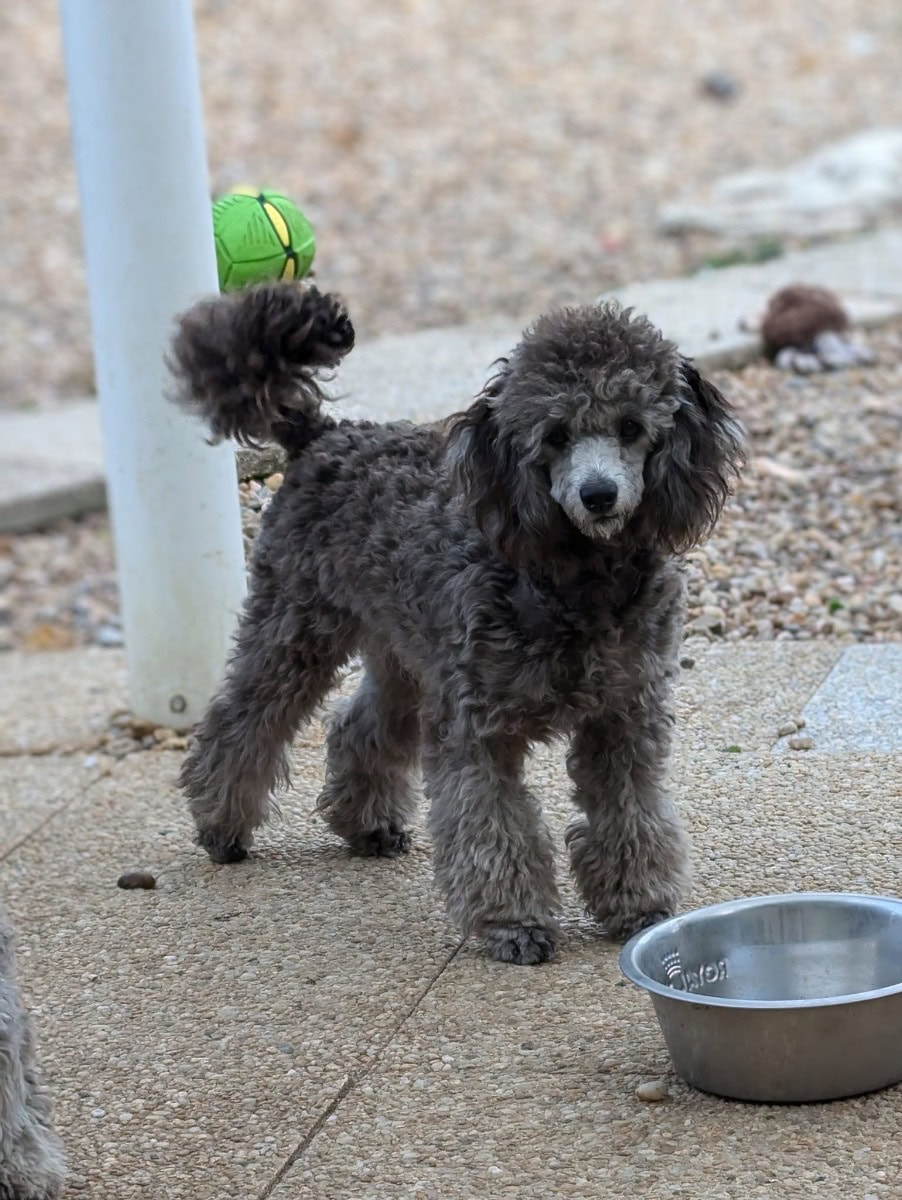Poodle miniature
Autres noms : Caniche nain, Barbone, Poodle, Dwarf poodle
Discover the miniature poodle, an intelligent and affectionate dog with a cheerful character. With its hypoallergenic coat and ideal size for apartments, it is the perfect companion for families and individuals. Learn more about its care, training, and needs.
Awareness of acquiring an animal
Adopting or breeding a dog is a responsibility that must be carefully considered. Dogs are loyal companions that require time, attention, and constant care. Whether for leisure, passion, or professional breeding, it is crucial to understand the specific needs of each breed. Provide them with a loving and stimulating environment, and avoid any impulsive acquisition that could harm their well-being. Be a vigilant and committed owner for a happy and healthy companion.
To learn more about animal welfare, we invite you to consult our FAQ by clicking the button below:
Origins and history
The miniature poodle is a dog breed that finds its origins in Europe, more specifically in France, where it was developed from dogs of the poodle type. Its ancestors were working dogs, often used for waterfowl hunting due to their agility and swimming ability. Over the centuries, these dogs evolved to become leisure companions, valued for their intelligence, friendly nature, and dense, curly coat.
During the 19th century, the breed gained popularity in aristocratic salons and among the bourgeoisie. Its small size and endearing personality contributed to making the miniature poodle a preferred choice for many families. The breed standard was established, and the miniature poodle quickly became recognized for its learning abilities and capacity to perform in shows.
Today, the miniature poodle is valued not only as a pet but also in various dog sports thanks to its intelligence and liveliness. The breed continues to charm with its loyalty, playfulness, and elegance.
Physical characteristics
The Miniature Poodle is distinguished by its elegant and well-proportioned appearance. Its body is compact and harmonious, with a shoulder height that generally ranges between 28 and 35 centimeters. Its ideal weight is between 4 and 6 kilograms, making it an ideal companion for urban households. The chest is well-developed while the back is straight and robust, giving the animal a proud posture.
The skull of the Miniature Poodle is oval, with a well-defined stop. Its eyes are round, expressive, and of medium size, often displaying a lively and intelligent expression. The ears are long, well-feathered, and hang down along the cheeks, adding to its distinctive charm. The tail, on the other hand, is often docked for aesthetic reasons, but is naturally well-proportioned to the rest of the body.
The coat is one of the most remarkable characteristics, being both dense and curly, providing a soft and silky texture. This coat requires regular grooming to prevent tangles and maintain its neat appearance. The coat color can vary, including a wide range of shades such as black, white, cream, and chocolate, reflecting the diversity of this breed. These features make the Miniature Poodle a cherished pet for its elegance and beauty.
Character
The miniature poodle is a popular companion dog known for its friendly and cheerful character. With a lively personality, it is often described as both intelligent and curious. This breed stands out for its ability to adapt to different environments, whether in urban or rural settings, making it an ideal companion for many families.
The intelligence of the miniature poodle is one of its most notable traits. It learns quickly and is often easy to train, which makes it an excellent candidate for obedience classes or even canine sports activities. Its sharp mind allows it to solve problems, but this also means that it requires regular mental stimulation. Interactive games and activities are therefore essential to prevent boredom.
Despite its small size, the miniature poodle has a confident and cheerful temperament. It is generally social and gets along well with children as well as other animals. This trait makes it an excellent pet, especially for families. However, it can be protective of its home, developing a certain wariness towards strangers. Proper socialization from a young age is therefore crucial to ensure balanced behavior.
Life expectancy
The lifespan of miniature poodles generally ranges from 12 to 15 years. This longevity is partly related to their size, as smaller dogs tend to live longer than their larger counterparts. Several factors influence the lifespan of a miniature poodle, including genetics, diet, and the care they receive throughout their life.
Diet plays a crucial role in keeping a miniature poodle healthy. A balanced diet, rich in essential nutrients, helps prevent diseases and promotes an optimal weight. Additionally, regular access to veterinary care allows for the early detection and treatment of health issues, thereby increasing their longevity potential.
Physical activity is also important. Miniature poodles are active and intelligent dogs that require regular exercise to maintain their physical and mental well-being. A lack of exercise can lead to obesity and other health problems that can shorten their lifespan. In summary, with proper care, a miniature poodle can lead a long and healthy life.
Exercise and activity needs
The toy poodle is an active and intelligent dog breed. To maintain their physical and mental well-being, they need a regular and varied exercise routine. A minimum of 30 minutes of daily activity is recommended, which can include walks, interactive games, and training sessions. These dogs particularly enjoy playing ball and agility courses, which stimulate their natural agility and competitive spirit.
In terms of mental activity, the toy poodle excels due to its quick learning ability. Puzzle games, interactive toys, and even obedience training can enrich their daily life. Interaction with the owner is essential, as these dogs often seek attention and affection. Involving them in family activities strengthens their emotional bonds while satisfying their exercise needs.
It's crucial to vary activities to avoid boredom. A mix of physical and mental exercises will help channel their overflowing energy and prevent undesirable behaviors, such as excessive barking or destruction. In summary, a daily commitment to providing your toy poodle with necessary exercise and mental stimulation will contribute to its overall health and happiness.
Recommended diet
The diet of miniature poodles must be carefully tailored to their specific nutritional needs. Due to their size and activity level, it is essential to choose high-quality kibble specifically formulated for small dogs. This kibble should contain a good balance of proteins, fats, vitamins, and minerals to support their growth and energy.
High-quality proteins, such as those from poultry, fish, or meat, should make up the majority of their diet. They are crucial for muscle development and maintaining optimal physical condition. It is also advisable to include omega-3 and omega-6 fatty acids, which promote skin and coat health, often highly valued in this breed.
Additionally, it is important to monitor portion sizes to avoid obesity, a common health issue in small breeds. Miniature poodles have a fast metabolism, but overfeeding can lead to complications. Finally, be sure to provide fresh water at all times, and if possible, consult a veterinarian for personalized advice on the most suitable diet for your pet.
Training and obedience
Training and educating a miniature poodle requires an approach tailored to its characteristics. Very intelligent and receptive, this dog excels at learning. It is essential to start training at a young age to establish a solid foundation. Using positive methods, such as rewards and encouragement, fosters a trusting bond between the owner and the animal.
Socialization is a crucial aspect of their education. Exposing the miniature poodle to different environments, people, and other animals contributes to the development of its personality. This helps prevent fearful or aggressive behaviors. Regular encounters and varied experiences enrich its development.
Due to its lively nature, it is important to keep the miniature poodle mentally and physically stimulated. Interactive games and regular exercise are essential to avoid boredom and prevent behavioral issues. In summary, effective training encourages harmony and happiness for this four-legged companion.
Behavior with children
The Toy Poodle is known for its balanced temperament and compatibility with children. This dog is generally very affectionate and sociable, making it an ideal companion for families. Its playful nature and boundless energy make it an excellent play partner for young children, fostering joyful and stimulating interactions.
A crucial aspect of its behavior is its desire to please. The Toy Poodle is often very receptive to training, which allows parents to easily teach appropriate behaviors and boundaries. This ability to learn quickly enables it to adapt to the household rules, ensuring a harmonious environment for both the children and the dog.
It is important to remember that, like all dogs, the Toy Poodle requires early socialization and exposure to various situations and people. This ensures that it develops solid social skills and does not become shy or anxious. With proper training and attention, these dogs can offer affectionate companionship and engaging communication, thereby contributing to a rewarding family dynamic.
Compatibility with Other Animals
The toy poodle is known for its gentle and friendly personality, making it an excellent companion for many households, including those with other pets. This dog typically has a sociable nature, allowing it to easily adapt to the presence of other animals, whether they're dogs, cats, or other small creatures.
Its compact size and moderate energy level facilitate interactions with animals of different sizes. Early socialization is essential when introducing it to other dogs. Gradual exposure to various environments and companions can help develop its confidence and friendly behavior towards its peers.
When it comes to cats, the toy poodle tends to be curious and playful. If both species are raised together or introduced positively, they can coexist harmoniously. However, it is crucial to monitor initial interactions to ensure the safety of all animals involved.
Finally, the comfort and respect for each animal's personality are paramount. Creating a balanced environment and supervising encounters will help establish trusting relationships, promoting a harmonious life at home.
Grooming needs
Grooming and maintaining a small dog is essential for its well-being and health. First of all, the frequency of brushing is crucial. It is recommended to brush the dog's coat at least two to three times a week to prevent the accumulation of tangles and to remove dead hair. A well-maintained coat also contributes to air circulation near the skin, which is essential for preventing skin irritations.
Next, trimming the fur is an important step. To maintain a neat appearance and avoid the coat becoming too long and difficult to manage, regular visits to a professional groomer are advisable. Generally, a visit every two to three months would ensure a healthy and stylish coat.
The health of the ears and eyes is also a priority. The ears should be checked regularly for any buildup of wax or moisture, which could lead to infections. Additionally, cleaning the eyes should be done to avoid staining and to maintain clear eyes.
Finally, dental hygiene is often overlooked, but it is of utmost importance. It is recommended to brush the dog's teeth several times a week to prevent periodontal diseases. By incorporating these grooming practices into your routine, you ensure your companion a healthy and happy life.
Health
The health of miniature poodles deserves special attention, as these dogs are prone to several specific conditions. First of all, it is important to monitor orthopedic issues. Miniature poodles can suffer from patellar luxation, a condition where the kneecap moves out of its normal position. This can lead to pain and mobility problems.
Next, dental health is essential. Miniature poodles often have dental issues due to the limited space in their jaws. It is crucial to provide them with regular brushing and professional dental care to prevent infections and other complications.
Additionally, these dogs are susceptible to eye problems, including cataracts and retinal degeneration. Regular veterinary examinations can help detect these conditions early. Finally, one should not overlook heart diseases, which are often hereditary and can affect their lifespan. In summary, consistent vigilance and preventive care are important to ensure the health and well-being of miniature poodles.
Environment and habitat
The toy poodle is a dog breed that is distinguished by its compact size and curly coat. To ensure its well-being, it is important to provide it with a suitable environment. This dog thrives in a family setting where it can regularly interact with its owners. A sufficient indoor space for free movement is essential, as this breed is very active and playful.
Regarding outdoor living, a small garden or a secure balcony is perfectly suitable. The toy poodle enjoys daily walks and outdoor activities. However, it is crucial to protect it from extreme weather conditions. In summer, excessively high temperatures can be harmful, while in winter, it is important to keep it warm.
Finally, the social environment plays a vital role in its development. This dog is sensitive and requires mental stimulation and interactions with humans and other animals. Thus, a dynamic and affectionate setting contributes to its harmonious development.
Name ideas
Choosing a name for a miniature poodle is a crucial step that reflects not only your pet's personality but also needs to be easy to pronounce and remember. A good name should be short, ideally one to two syllables, to facilitate recognition by the dog. It is often preferable to avoid names that sound like common commands such as "sit" or "no" to prevent any confusion.
It’s also interesting to choose a name that evokes physical or behavioral traits of your miniature poodle. Poodles are often joyful, playful, and affectionate, so a name that captures their essence can strengthen your bond with them. Also, consider your personal taste and how the name resonates with you. Here are some suggestions:
Bijou, Coco, Choco, Moustache, Nino, Pompom, Loulou, Biscuit, Titi, Flocon, Luna, Zora, Jasmin, Saphir, or Miel.
Take your time to find the one that suits your miniature poodle best, and don’t hesitate to try out several names before making your final choice.
Average purchase price
The prices of toy poodles can vary significantly based on various factors, including lineage, color, age, and geographical location. In general, the cost of a puppy from a reputable breeder typically ranges from 800 to 2000 euros. Puppies from champion bloodlines or those with specific characteristics can fetch even higher prices, sometimes exceeding 3000 euros.
Color also plays a crucial role in determining the price. Rarer shades, such as blue or chocolate, may sell for higher prices compared to more common shades like black or white. Additionally, it is important to consider the extra costs associated with caring for the animal, such as veterinary care, food, and regular grooming.
Finally, adopting a puppy from a shelter or rescue organization can also be a valid option. While the initial cost is often much lower, it is essential to ensure that the animal has received the necessary care before adoption. These choices affect not only the initial cost but also the long-term well-being of the animal.
Expenses
Owning a miniature poodle involves various monthly expenses that owners must anticipate. On average, these costs amount to about 100 to 150 euros per month. This estimate includes several categories of essential expenses to ensure the well-being of the animal.
Firstly, food constitutes a significant portion of the budget. A small dog requires a diet tailored to its nutritional needs, with costs that can reach 30 to 50 euros per month for quality kibble. It is crucial to choose breed-specific foods to ensure the long-term health of the dog.
Next, veterinary expenses, including vaccinations, parasite treatments, and regular check-ups, must also be taken into account. These costs can average around 20 to 40 euros per month, although additional visits may be necessary in case of illness or injury.
Finally, other expenses such as maintenance of accessories (toys, brushes, cushions) and grooming fees can add up. In summary, it is essential to budget realistically to maintain the quality of life for your pet.
Destination and usage
The Toy Poodle is a breed of dog highly valued for its qualities as a companion animal. Its compact size and affable nature make it an ideal choice for families and people living in apartments. Affectionate by nature, these dogs quickly bond with their owners and are often described as loyal and attentive companions. Their sociable temperament makes them particularly adaptable, allowing for harmonious interactions with children and other pets.
In terms of activities, Toy Poodles often excel in recreational pursuits. They are enthusiastic during playtime and enjoy daily walks, contributing to their physical and mental well-being. Furthermore, their intelligence makes them quick learners, which facilitates the acquisition of basic commands and fun tricks. This ability to learn rapidly strengthens the bond with their owners and provides mutual satisfaction.
Finally, the Toy Poodle, thanks to its hypoallergenic coat, is also a preferred option for people prone to allergies. Their regular grooming helps maintain a clean environment in the home, making this breed even more appealing to allergy-sensitive households. In summary, the Toy Poodle combines charm, intelligence, and adaptability, making it an excellent choice for a pet.
Legislation and regulation
The legislation regarding the miniature poodle dog breed varies significantly from country to country. In some nations, this breed is widely accepted and bred without any particular restrictions. The regulations then primarily focus on animal welfare, dog health, and breeding conditions. Breeders often have to comply with specific health standards to ensure the quality and safety of the animals.
Other countries impose stricter regulations, sometimes due to historical or cultural perceptions of certain breeds. This can include restrictions on breeding, specific conditions for raising them, or even temporary bans related to public health or safety concerns. In these cases, it is crucial for owners and breeders to be well-informed about the laws in effect to avoid any violations.
Animal protection organizations and breed clubs play a crucial role in raising awareness about responsible breeding. They encourage owners to adopt practices that promote the health and well-being of dogs, while advocating for legislation that rigorously protects animals. Discussions around dog breed regulations continue to evolve, often in response to social and ethical concerns. In summary, the legislative situation regarding this breed is dynamic and requires constant vigilance from the stakeholders involved.
Official recognition
The miniature poodle breed is internationally recognized in many countries. In most European countries, as well as under the Fédération Cynologique Internationale (FCI), this variant of the poodle is officially accepted. Breed standards are clearly defined, including criteria for size, temperament, and appearance. This recognition has allowed for the organization of numerous dog shows, providing breeders and owners the opportunity to have their dogs evaluated according to precise standards.
In North America, recognition is also present. The American Kennel Club (AKC) includes the miniature poodle in its breed classification. Here as well, competitions and events are regularly organized, attracting many enthusiasts and participants wishing to promote the breed.
In certain regions, recognition may vary. In countries where cynology is less developed, the miniature poodle may not enjoy the same level of notoriety or organization. However, the growing popularity of this breed among dog lovers contributes to enhanced visibility and a greater potential for acceptance.
Pedigrees
To obtain a pedigree for the Miniature Poodle breed, several specialized registries and clubs play a crucial role. In France, the Société Centrale Canine (SCC) is the main organization responsible for registering purebred dogs. Their services allow for the issuance of official pedigrees, certifying the purity of the dogs' lineage. The SCC issues these documents following specific procedures, such as the registration of puppies in the Livre des Origines Français (LOF).
In other countries, similar organizations perform equivalent functions. In Belgium, for example, the Livre des Origines Belge (LOB) also provides the opportunity to register Miniature Poodles and obtain a pedigree. Abroad, associations like the American Kennel Club (AKC) in the United States or the Kennel Club in Great Britain offer similar registration services, allowing breeders and owners of Miniature Poodles to obtain lineage documents.
In addition to these registries, numerous breed clubs are dedicated to the promotion and preservation of the Miniature Poodle. These clubs, often affiliated with the SCC or other national organizations, organize events, exhibitions, and competitions, which contribute to the recognition and appreciation of the breed. Joining these clubs can also provide owners with access to valuable resources regarding breeding, health, and the well-being of their animals.
Prohibitions
Restrictions regarding dogs can vary significantly from country to country, depending on local legislation, public safety concerns, and cultural attitudes towards certain breeds. In several countries, the restrictions mainly target dogs considered dangerous, but it is important to note that the toy poodle, due to its size and generally balanced temperament, is rarely subjected to strict bans.
In some European countries, legislation on dangerous dogs may include specific categories, often related to breeds known for their aggressiveness. However, the toy poodle typically does not fall into these categories. Conversely, regulations may exist regarding the breeding, sale, or responsible ownership of any breed, aimed at ensuring animal welfare and safety.
At the local level, municipalities may adopt rules concerning the size of dogs in public spaces or during gatherings, which could indirectly affect the freedom of a toy poodle owner. It is advisable for owners to inquire about the legislation in force in their area to ensure compliance with local standards and to contribute to a harmonious environment for all.
Breeders of Poodle miniature
Want to see more breeders of Poodle miniature?
Check out the page of our directory listing all breeders of Poodle miniatureClassified Ads of Poodle miniature
Want to see more ads of Poodle miniature?
Check out the page listing all the ads of Poodle miniatureBreed clubs of poodle miniature
No of poodle miniature breed clubs are currently registered on Preeders.
If you would like to highlight your breed club, sign up for free now and be the first to appear on this page.






